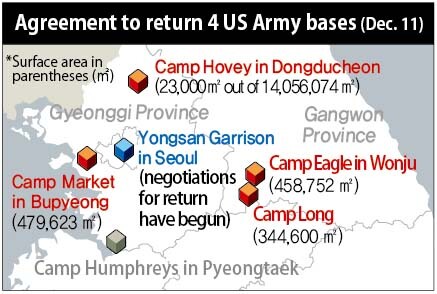Posted on : Dec.12,2019 17:28 KST
 |
|
The US Army installation Camp Market in Bupyeong, which the US has promised to return to the South Korean government.
|
Process of returning Yongsan Garrison to South Korea underway
 |
|
The US Army installation Camp Market in Bupyeong, which the US has promised to return to the South Korean government.
|
The US has agreed to immediately return four military bases in Wonju, Bupyeong, and Dongducheon that have been closed and neglected for 8-10 years and to continue deliberating with South Korea about the question of cleaning up environmental contamination at the bases. The process of returning the Yongsan Garrison to South Korea has also gotten underway. While the two sides have created a framework for assessing responsibility for contamination at the bases even after the handover, the US isn’t likely to readily accept responsibility.
 |
|
Agreement to return 4 US Army bases (Dec. 11)
|
During the 200th meeting of the Status of Forces Agreement (SOFA) joint committee at Camp Humphreys, in Pyeongtaek, on Dec. 11, the South Korean government agreed on the principle of resuming control of the American bases. The US intends to immediately hand over four bases, namely Camp Eagle and Camp Long in Wonju, Camp Market in Bupyeong, and the Shea Range at Camp Hovey in Dongducheon. These bases were all closed between March 2009 and October 2011, but the handover has been delayed until now because of wrangling between the two countries over the level of contamination and the responsibility for decontamination. Residents in the areas have been asking for the handover process to be sped up, complaining about the possibility of contamination spreading and about the difficulties posed to development plans.
As the condition for accepting the handover of the bases, Seoul demanded that the US take responsibility for decontamination, that US Forces Korea (USFK) beef up environmental management of the bases it’s currently using, and that deliberations about the possibility of revising documents related to SOFA are continued.
 |
|
Process of returning bases and history of Yongsan Garrison
|
American officials unlikely to accept responsibility for contamination at bases
“The base handover is a matter that needs to be resolved urgently, but the deliberations with the Americans will take time. That’s why we agreed on the immediate handover of the four bases on the condition of keeping talks going in the future,” said Lim Chan-woo, the official responsible for USFK base handovers at Seoul Korea’s Office for Government Policy Coordination.
The South Korean government’s plan is to cover the cost of decontaminating the four bases that are being returned for now and then to bill the US if it takes responsibility for decontamination in future deliberations. It’s estimated that removing pollutants from the four bases will cost about 110 billion won (US$92.71 million) altogether over the next two years, with some 77.3 billion won (US$65.15 million) needed to clean up dioxins detected at Camp Market. The pollutants at the other bases mostly consist of oil or lead and other heavy metals. The clean-up costs are expected to add up to 20 billion won (US$16.86 million) at Camp Long, 7.2 billion won (US$6.07 million) at Camp Hovey, and 2 billion won (US$1.69 million) at Camp Eagle.
South Korea and the US have also agreed to launch the process for transferring control of the Yongsan Garrison. Seoul explained that it reached this agreement to bring an end to the era of Yongsan hosting foreign armies and to ensure that the plan to build a park there isn’t delayed. This agreement is expected to get the ball rolling for the city of Seoul and the central government to complete the park by 2027.
The two countries’ deliberations about who should be responsible for dealing with the contamination aren’t expected to go smoothly. To date, there are no examples of the US taking responsibility for contamination and covering the cost of decontamination at military bases it has handed over in other countries, such as Japan and Germany. While the US acknowledges that the four bases are polluted, it reportedly denies that the contamination poses a “known, imminent, substantial endangerment to human health.”
By Noh Ji-won, staff reporter, and Yoo Kang-moon, senior staff writer
Please direct comments or questions to [english@hani.co.kr]












